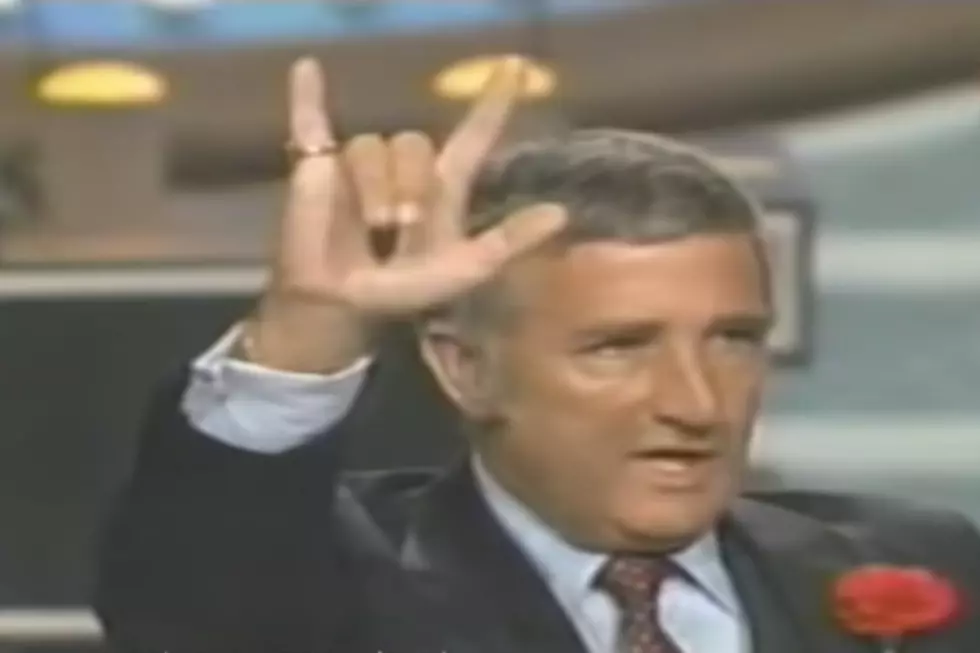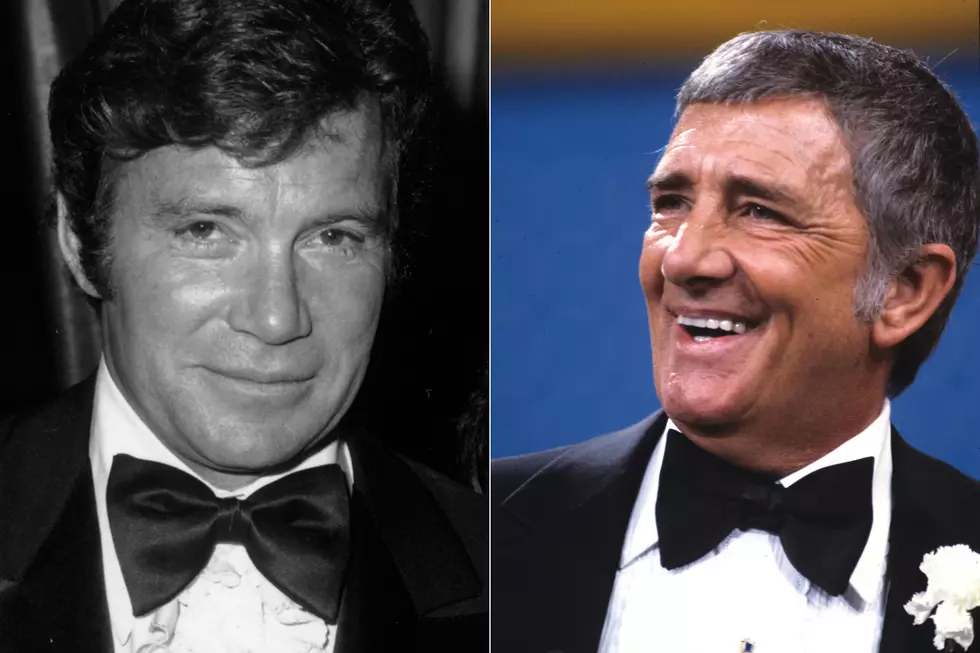
35 Years Ago: Richard Dawson’s Tearful Farewell to ‘Family Feud’
On June 14, 1985, original host Richard Dawson gave his heartfelt goodbye to the long-running game show Family Feud.
Dawson began his career as comedian and actor in England, appearing on a variety of programs, including the Benny Hill Showcase. After coming Stateside, the actor scored guest roles on various TV shows like The Dick Van Dyke Show and The Outer Limits. But playing the role of Peter Newkirk on the series Hogan’s Heroes really put him in the spotlight. The show lasted six seasons and made Dawson a TV star, which he easily parlayed into game show work in ‘70s.
The actor appeared on The Game Game, I’ve Got a Secret and Password, but his most prominent game show role was as a panelist on The Match Game, a popular series created by Mark Goodson. Dawson was one of the show regulars, appearing on more than 1,200 episodes. His outgoing personality and broad appeal led to a surprising agreement.
“I had a deal with Mark Goodson,” Dawson recalled in an interview with the Archive of American Television. “The next pilot that they went to, whatever it was, they would have to offer me.”
So when Dawson heard about Goodson’s next project not via an offer but instead through Hollywood rumor, he became perturbed.
“Suddenly we hear they’re going to do a new pilot called Family Feud. And they’re interviewing people and it looks as though (William) Shatner … was on the leading edge of getting it.”
Dawson immediately scheduled a meeting with Goodson and demanded an explanation. The TV executive offered to give Dawson an audition, but as the aspiring host rightly pointed out, Shatner was married to CBS executive Perry Lafferty’s daughter. “He was the one who was going to make a decision whether this show would go on or not. And he doesn’t have any daughters left for me to marry!”
Goodson appeased Dawson and promised he’d receive fair consideration. The host wowed in his audition, eventually beating Shatner out for the gig.
Family Feud premiered on July 12, 1976. It would go on to become the highest-rated game show on daytime television.
Dawson’s charm was imperative in the program’s success. The host exchanged friendly banter with contestants in every episode, regularly improvising jokes. It was also Dawson who came up with many of the show’s subtle phrases, like applauding “good answer” and announcing “survey says.” Still, there was one habit that received criticism: his penchant for kissing the female contestants.
“Gotta stop the kissing,” Dawson recalled the network telling him. “So many complaints.” The host started the tradition as a way to calm nervous contestants. “It was something my mother used to do for me,” he’d later explain. When initially told to stop, Dawson went on camera and asked the viewers to voice their opinion directly to the network. Thousands of letters poured in, with the overwhelming majority supporting the kisses. As it turned out, many of those aforementioned complaints came from viewers in the South who were upset that Dawson’s kiss was offered to all races.
The host also created a regular routine for his closing remarks, inspired by a letter from one of the show’s earliest fans.
“A lady wrote to me, she said ‘My little girl is deaf. And when Feud comes on, somehow she can sense it and she dances to that music,'" Dawson recalled. "And she sent me a little picture, a little girl about four years old.” The mother asked Dawson if he could sign the phrase “I love you” at the end of an episode as a message to the little girl. It became part of the host’s regular sendoff, which he’d combine with a phrase from his youth.
“Every night when my mom would say goodnight to me, during the war, after the war, always the same: kiss on the cheek, and say to me, ‘May God bless all the little children of the world.’”
Family Feud enjoyed a long run of success, both in daytime and primetime slots. However, by the early ‘80s, competition in the game show world had become fierce. Wheel of Fortune became a national powerhouse while sister program Jeopardy! was also a rousing success. Feud’s ratings saw a steady decline and, in 1985, Goodson decided to pull the plug on the original incarnation.
Dawson’s final show would be June 14, 1985. Following the game, the host addressed his audience, both in the studio and those watching at home.
“I’ve had the most incredible luck in my career," Dawson confessed. "I’ve done lots and lots of jobs. And I’ve never ever had a job like Family Feud. I never dreamed I would ever have a job where so many people could touch me and I could touch them. There’s a great magic about this show that I’ve never seen on any other show.”
He continued: “There were people I know that got upset that I kissed people. I kissed them for luck and love, that’s all. That’s what my mother did to me. There were people upset that I would embrace or hug someone of a different color. The first time I ever saw people of any color was when D-Day left from my hometown in England to go and free Europe from the war. And there was every color that you could imagine, and I’d not seen that in England. And I asked my mother about it, ‘Is something wrong?’ She said, ‘No. God makes people. You understand that, don’t you?’ I said ‘Yes.’ She said, ‘Who makes a rainbow?’ I said, ‘God.’ She said, ‘I’d never presume to tell anyone who could make a rainbow what color to make children.’ And she changed my whole life with that statement.”
Choking back tears, Dawson reverted to his signature sign-off one final time.
“So I leave you with love. And for the little girl that, nine years ago I first signed to, I guess she’s 13 now, I’ll think of you every day. God bless all the little children in the world.”
Family Feud returned in 1988 with Ray Combs as host and ran until 1995, when it was again taken off the air. It returned in 1999 and has continued airing ever since, starring Louie Anderson (‘99-’02), Richard Karn (‘02-’06), John O’Hurley (‘06-’10) and Steve Harvey (‘10-present).
Dawson was invited back briefly to host in 1994, shortly before the show’s second cancellation. He worked sparingly in the ensuing decades, occasionally doing voice-overs while settling into semi-retirement. He died in 2012 at the age of 79.
More From KLUB Tejano 106.9




![Ridiculous ‘Family Feud’ Answer About Zombies Turns Into a Race Issue [VIDEO]](http://townsquare.media/site/241/files/2013/11/FamilyFeud.jpg?w=980&q=75)


